What are the Best Bitcoin Wallets?12 min read
Reading Time: 8 minutesIf you’ve bought some Bitcoin or you accept it at your business, it’s important for you to take your knowledge of Bitcoin security to the next level. It’s too risky to keep large amounts of BTC on an exchange and there are safer security practices than keeping your private keys on a hot wallet. With hackers always looking to improve their techniques to compromise your funds, you need to remain diligent with your own security and always take precautionary measures to protect yourself. In this article, we are going to do our best to highlight the best Bitcoin wallets available to help you decide which wallet is best for you!
Did you get the keys?
So what exactly are public & private keys and why are they important to making transactions with Bitcoin? These keys are sophisticated forms of cryptography that give you security when accessing your funds and it’s important to know the difference between the two. A Public Key encrypts data so a sender can securely send a message to a receiver. A Private Key decrypts data allowing a user access to encrypted data. These keys are tied to your Bitcoin wallet and allow you to transact and store funds properly.
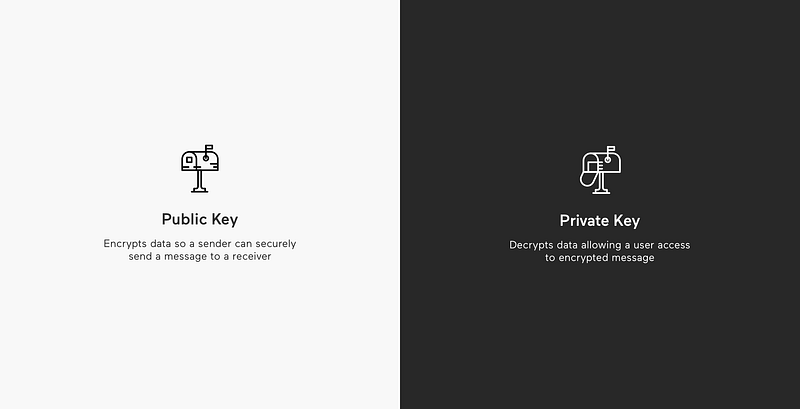
For example, picture a mailbox. A public key will allow the user to drop mail into the box but not allow access to the contents inside the box. The only way to open the box and access its contents is by using a private key. So as you can see, keeping your private key safe should be your first priority. Having access to your funds protected by this level of security is within the fundamental basics of cryptography and Bitcoin.
Seed / Password
With non-custodial wallets, there is another level of security called a Seedphrase. A Seed allows you access to your private keys by entering a specific assortment of words as the passcode. Having aSeed to your wallet is critical because it provides an extra level of security and it can also be helpful with restoring a wallet that you have lost access to.

Properly storing your seed is of dire importance because it is your only way to restore your access to your funds. Once someone has access to your Seed, they have access to your private keys which means they have access to your funds. There are many ways you can protect your Seed for example like writing it down digitally or physically and splitting up the words into different locations. When it comes to protecting your Seed, always remember how you can access it otherwise it will be almost impossible to regain access to your Bitcoin.
Now that you have a better understanding of what a seed is and what purpose your public and private keys have, you need to know another level of security to protect the password to your wallet.
2 Factor Authentication
When it comes to protecting your password without compromising too much of the easy accessibility to your wallet, the best answer is 2 Factor Authentication (2FA). This security feature allows a user to access their wallet after entering a one-time passcode from a 2FA application that has been tied to their wallet previously by the user. 2FA can also be used for cold storage tied to a hardware wallet without downloading an app. For example, Trezor, a hardware Bitcoin wallet manufacturer, requires the user to manually plug in their hardware and use the PIN that is displayed on their device before a user can access their wallet. As an extra level of security, the application resets this passcode every 30 seconds making sure the passcode cannot be reused. Having 2FA enabled on your wallet is an important precautionary security measure that everyone should take to protect their funds. It may be another tedious step to accessing your funds but in the end, it’s the security of your money that matters.

In the past, we stored our funds in our mattresses or in a safe at the bank and protected our credit card information from theft or fraud. When it comes to storing your Bitcoin safely, you are solely responsible for the security of your own Bitcoin.
With Bitcoin, transactions are irreversible! If someone is able to access your wallet and send out your funds, you can kiss that Bitcoin goodbye forever.
Since there is no “Customer Support” to help you recover stolen Bitcoin, it’s important for you to understand what measures you can take to protect your funds. Your choice of how you store your Bitcoin is very important so you should always keep up to date with all the information about the wallet you are using.
Types of Bitcoin Wallets
Cold Storage (Most Secure)
- Hardware Bitcoin Wallets
- Paper Bitcoin Wallets
Hot Wallets (Least secure)
- Web Bitcoin Wallets
- Desktop Bitcoin Wallets
- Mobile Bitcoin Wallets
But what is the difference? A Hot Wallet keeps your private keys on a device that has access to the internet, Cold storage keeps them on a device that has no internet connection
There are different levels of security between software & hardware wallets and it’s important to understand each level to protect your funds. For example, cold storage wallets, you can keep your private keys offline and never expose them to your computer but this adds extra steps to the accessibility of your funds. With hot wallets, you have the ability to access your Bitcoin immediately online but leave yourself at risk of malware attacks.
There are multiple options when it comes to security so here’s a breakdown :
Web Browser based Bitcoin Wallets
Web browser-based wallets usually provide a convenient user experience for newer users but come at the cost of custody. These Custodial services hold your private keys for you but allow you easy access to them from a web browser. When it comes to storing your Bitcoin safely, it’s important to understand who has custody of it.
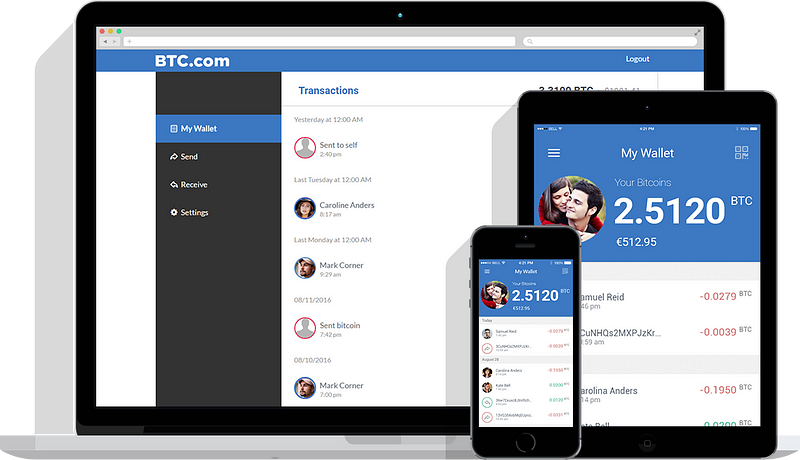
Examples: Coinbase, Xapo, Circle
Pros:Users can easily access their Bitcoin online & most web wallets have a smooth user experience, with more functionalities and an easy on-ramp.
Cons: The Web Interface acts as the storage company of your Private keys, and is the real owner of your Bitcoin and not you.
Desktop Wallets
Desktop wallets can be downloaded & installed to your computer and uses your hard drive to store your private keys (these wallets can also be paired with hardware like TREZOR to store the keys offline). These types of Bitcoin wallets are more secure than web browser or mobile wallets; however unless paired with hardware these wallets are still connected to the internet leaving them open to malware attacks making them inherently less secure.
Examples: Electrum, Copay, Exodus
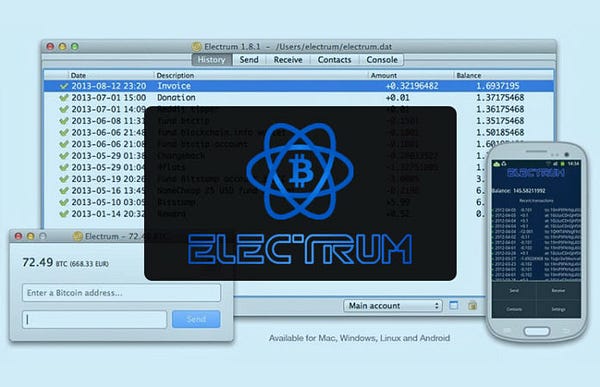
Cons: Desktop wallets are not great for on the go transactions unless the service provides a mobile version. Also, If your computer is affected by Malware, you are at very high risk of losing access to your Bitcoin.
Mobile Wallets
Similar to Desktop wallets, but these wallets can only be used via the application on a mobile phone. Mobile wallets allow users to make transactions from anywhere in the world, truly allowing peer-to-peer transactions. Most mobile wallets come with low levels of privacy by connecting to a full node that knows what transactions you are listening to and how much money you have sent & received. Though these wallets do face the drawback of being tied to a mobile device that can be easily misplaced or stolen, they do provide a great user experience and provide an easy on-ramp for new Bitcoin users.
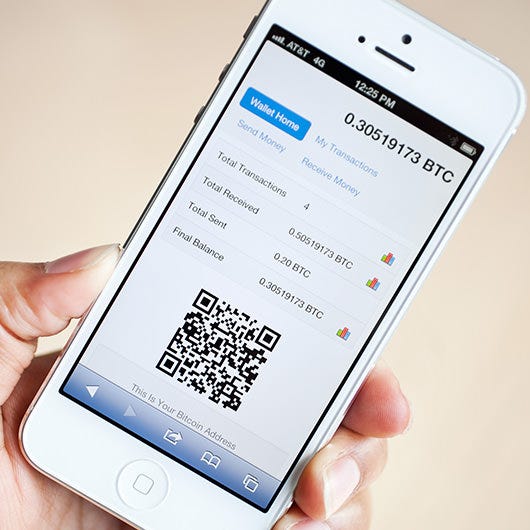
Pros: Easily access your Bitcoin and make purchases in-store or online within the palm of your hand and use your money anywhere at any time that you’re connected.
Cons: If someone is able to steal your phone and you don’t have the proper security measures like having your phone locked, your Bitcoin is at risk. You can mitigate this risk by also keeping a copy of your recovery seed off your phone and on multiple pieces of paper.
Hardware Wallets (recommended)
Hardware wallets are the best option when it comes to securing your private keys offline. Your hardware wallet requires your actions for every transaction providing another level of security to the software the wallet company uses. You can store large amounts of Bitcoin offline on USB drive devices offline and simply plug the drive into any laptop or desktop and send, receive, and store your Bitcoin. The interfaces for these devices are very user-friendly so anyone can buy and secure BTC themselves. Similar to software wallets, you have private keys and a pin code to access your hardware wallet. We recommend to ALWAYS purchase your hardware directly from the company and never trust a device that has unusual packaging.
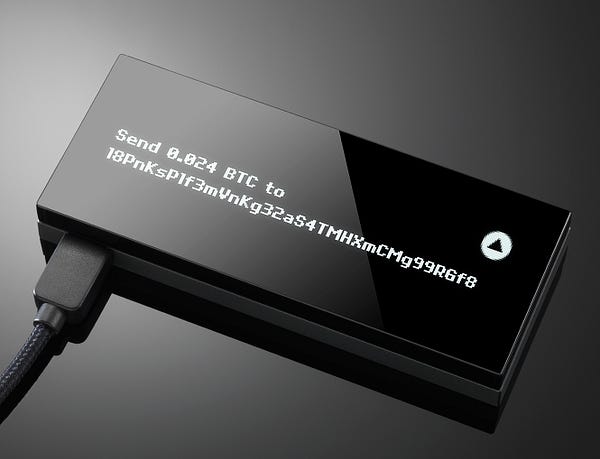
Pros: Smooth user experience and the most secure way to store your Bitcoin. Easy to create a backup and it’s difficult to make mistakes using a hardware wallet – the process is easy for any level user. As a cold storage, your private keys are offline and reduces the risk of theft
Cons: For this level of security the price is not cheap. For a standard hardware wallet, the minimum price to pay is 50$. Also, if you lose your device, access to your private keys, AND access to your recovery seed, your Bitcoin is as good as gone!
Paper Wallets
Paper wallets are exactly what they sound like, a paper document that contains a public address and private keys that can be used to send & receive Bitcoin. There are services that allow you to print your private keys as a QR code on the paper wallet and the code can be scanned by a mobile wallet and the keys will be added to the software wallet to make a transaction. When creating a paper wallet you must be diligent with your security and always make sure there is no spyware on your computer as you are creating your wallet. Your paper wallet will act as a cold storage if the paper was generated on a computer that has no access to internet connection. Along with proper online security practices, you must be diligent with protecting the physical wallet itself because essentially you are printing private valuable information on a piece of a paper that can be easily stolen or destroyed.
Pros: As long as you never introduce your private keys/seed to a desktop or mobile wallet, a paper wallet acts as a cold storage that is always offline. The private keys remain offline and reduce the risk of theft and this is the cheapest form of wallet.
Cons: It’s a much slower process to use your Bitcoin when using these wallets. They can also be easily destroyed by flood or fire. (Prevent this by creating multiple wallets and storing in different locations for extra precaution.)
As you can see, there are plenty of wallets to choose from so don’t feel any pressure sticking to only one. Try out multiple wallets with small amounts of Bitcoin so you can get a feel for them first but make sure you don’t mix up all those keys. As an extra security precaution we recommend storing your Bitcoin on multiple wallets; we like to think of mobile wallets as a “checking account” while hardware wallets could be seen as your “savings account”.
With so many options to choose from when it comes to storing and transacting with Bitcoin, you must always be wary of trust. OpenNode attempts to minimize trust while delivering great user experience and easy infrastructure by allowing scheduled & automatic withdrawals. Always remember that how you store your Bitcoin is completely your responsibility, that’s the beauty of Bitcoin & being your own bank. With so many ways to secure yourself and your Bitcoin, you have to remain diligent to make sure your funds are always safe.
Stay tuned for more in our upcoming articles that will break down the basics of Bitcoin and sign up with OpenNode today to start accepting Bitcoin for your business.
OpenNode seeks to bridge the gap between Bitcoin and the rest of the world. Our simple platform makes using Bitcoin for your online business a breeze. OpenNode offers instant exchange from Bitcoin to many world currencies. We also offer instant transactions powered by the Bitcoin Lightning Network. For more information about our offerings, be sure to check out our website at opennode.co.
Edit 9/21/20: Bitcoinpaperwallet.com removed as a recommended paper wallet for vulnerabilities.

